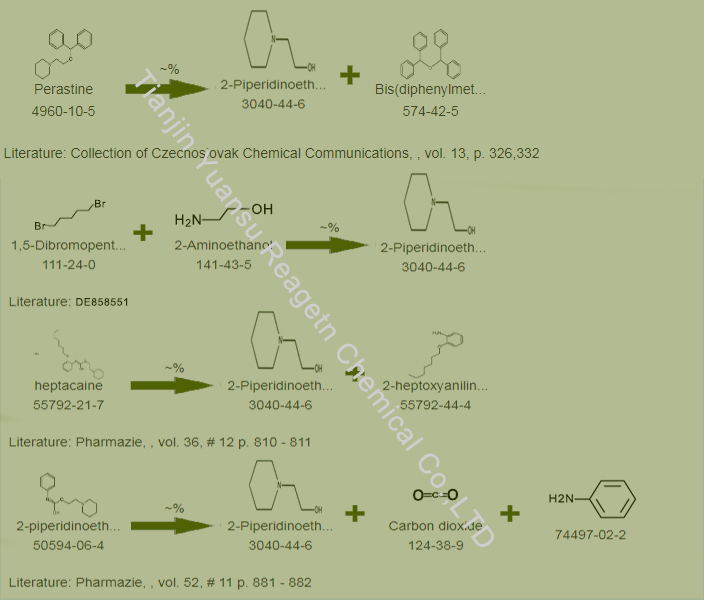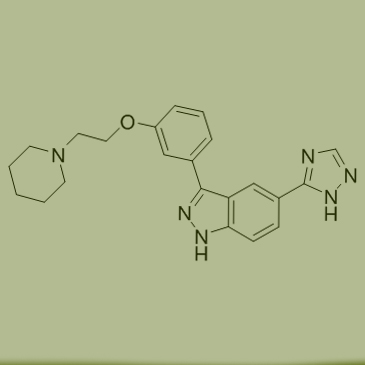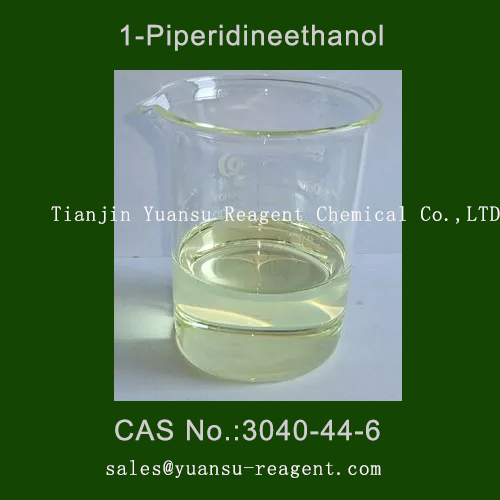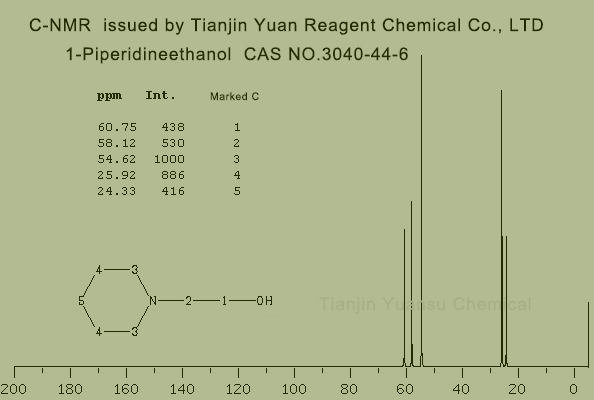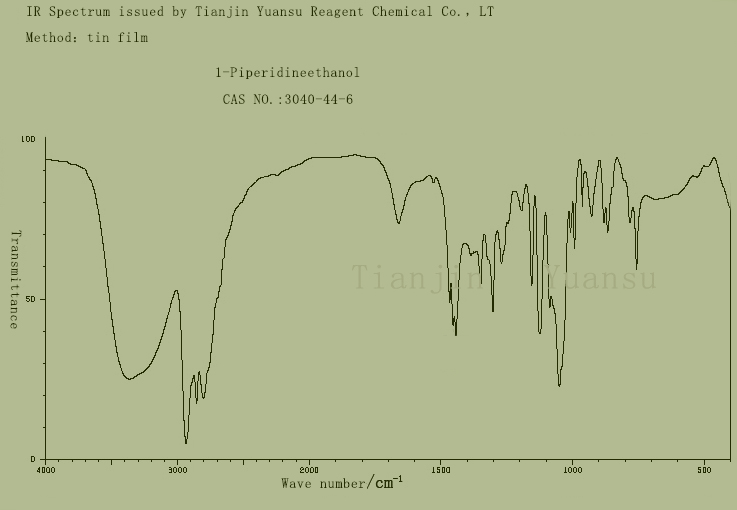1-Piperidineethanol
What is 1-Piperidineethanol, cas no:3040-44-6,a producer telling you the result.
CAS NO.3040-44-6
If you need the products .Please send your inquiry to us through e-mail: sales@yuansu-reagent.com
To begin with, let us tell you what is the basic information of 1-Piperidineethanol ?
|
Molecular Formula |
C7H15NO |
Molecular Weight |
129.20 |
|
Density |
1.0±0.1 g/cm3 |
Boiling Point |
200.5±0.0 °C at 760 mmHg |
|
Flash Point |
91.2±18.5 °C |
Melting Point |
16°C |
Like many stuff, it has many synonyms as follows
|
MFCD00006512 |
|
PPOH |
|
2-piperidino-1-ethanol |
|
1-piperidinyl-2-ethanol |
|
1-Piperidineethanol |
|
2-(Piperidin-1-yl)ethanol |
|
2-Piperidinoethanol |
|
hydroxyethyl piperidine |
|
N-Piperidineethanol |
|
2-hydroxyethylpiperidine |
|
2-PIPERIDINETHANOL |
|
PIPERIDINOETHANOL |
|
β-Piperidylethanol |
|
β-Piperidinoethanol |
|
1-PIPERIDINOETHANOL |
|
1-(2-Hydroxyethyl)piperidine |
|
N-(2-Hydroxyethyl)Piperidine |
| 2-(1-Piperidinyl)ethanol |
First, the chemical is very special, some technical indexes as below
If you need the products .Please send your inquiry to us through e-mail: sales@yuansu-reagent.com
Physical property data
1. Appearance: Colorless liquid
2. Density (g/mL, 25/4 ℃): 0.97
3. Relative vapor density (g/mL, air=1): unavailable
4. Melting point (º C): not available
5. Boiling point (º C, atmospheric pressure): 199-202
6. Boiling point (º C, 5.2kPa): not available
7. Refractive index: 1.4794-1.4814
8. Flash point (º C): 68
9. Specific rotation (º): not available
10. Spontaneous combustion point or ignition temperature (º C): not available
11. Vapor pressure (kPa, 25 º C): not available
12. Saturated vapor pressure (kPa, 60 º C): not available
13. Combustion heat (KJ/mol): not available
14. Critical temperature (º C): not available
15. Critical pressure (KPa): not available
16. Logarithmic value of oil-water (octanol/water) partition coefficient: not available
17. Explosion upper limit (%, V/V): not available
18. Lower explosive limit (%, V/V): not available
19. Solubility: Can be miscible with water and soluble in ethanol.
toxicology data
1.
Test method: Oral administration
Intake dose: 1498 milligrams per kilogram
Test object: Rodent mouse
Toxicity type: Acute
Toxic effects: Detailed toxic side effects without reported lethal dose values
2.
Test method: Venous
Intake dose: 166 milligrams per kilogram
Test object: Rodent mouse
Toxicity type: Acute
Toxic effects: Detailed toxic side effects without reported lethal dose values
3.
Test method: Oral administration
Intake dose: 250 milligrams per kilogram
Test object: Mammal - Cat
Toxicity type: Acute
Toxic effects: detailed effects on seizure or epilepsy threshold
Ecological data
This substance may be harmful to the environment and should be given special attention to water bodies.
Molecular structure data
1. Molar refractive index: 37.48
2. Molar volume (m3/mol): 132.5
3. Waiting for Zhang Biarong (90.2K): 324.1
4. Surface tension (dyne/cm): 35.6
5. Polarization rate (10-24cm3): 14.86
Calculate chemical data
1. Reference value for hydrophobic parameter calculation (XlogP): None
2. Number of hydrogen bond donors: 1
3. Number of hydrogen bond acceptors: 2
4. Number of rotatable chemical bonds: 2
5. Number of tautomers: None
6. Topological molecule polarity surface area 23.5
7. Number of heavy atoms: 9
8. Surface charge: 0
9. Complexity: 69.3
10. Number of isotopic atoms: 0
11. Determine the number of atomic stereocenters: 0
12. Uncertain number of atomic stereocenters: 0
13. Determine the number of chemical bond stereocenters: 0
14. Number of uncertain chemical bond stereocenters: 0
15. Number of covalent bond units: 1
Nature and stability
If used and stored according to regulations, it will not decompose.
Storage method
Sealed in a cool and dry environment
synthetic method
Currently unavailable
Second, the Synthetic Route we will recommend is the most important for your reference?
First, synthesis line of 1-Piperidineethanol CAS NO.3040-44-6 as follows
Third, what is the usage of 1-Piperidineethanol CAS NO.3040-44-6 ? pleas see below
If you need the products .Please send your inquiry to us through e-mail:sales@yuansu-reagent.com
Other usage:
Used for the synthesis of 3-[3-(2-piperidin-1-ylethoxy)phenyl]-5-(1H-1,2,4-triazol-5-yl)-1H-indazole, Cas no. 395104-30-0
Used for the synthesis of 3-(2-piperidin-1-ylethoxy)-1,2-benzothiazole Cas no. 19767-25-0
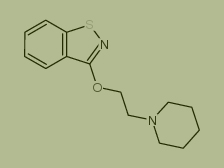
Used for the synthesis of 1-[2-(4-bromophenoxy)ethyl]piperidine Cas no. 836-58-8
Besides Safety Information of 1-Piperidineethanol CAS NO.3040-44-6 is also important when handling it
|
Hazard Codes |
Xi |
|
WGK Germany |
3 |
|
H.S.Code: |
29333990.99 |
|
TSCA |
Yes |
|
HazardClass |
IRRITANT |
What is the appearance of 1-Piperidineethanol CAS NO.3040-44-6? Please see the picture of 1-Piperidineethanol CAS NO.3040-44-6, below
If you need the products .Please send your inquiry to us through e-mail: sales@yuansu-reagent.com
Specification of 1-Piperidineethanol CAS NO.3040-44-6, is below
Apperance: colorless to light yellow liquid.
Assay: 99 min by GC
IR identity: conform
Water:0.5% max by K.F.
C-NMR picture of 1-Piperidineethanol CAS NO.3040-44-6 is as follows,
IR picture of 1-Piperidineethanol CAS NO.3040-44-6 is as follows,
Reference of Article cited for your reference below,
(1)
The Enhancing Effect of Ion-pairing on the Skin Permeation of Glipizide
PMID: 19636711
Publication Date: 2009
Publication Name: AAPS PharmSciTech
(2)
Nanoporous TiO2 film electrode for electrocatalytic reductionof 2-pyridineethanol in ionic liquids
Publication Date: 2007
Publication Name: Journal of Porous Materials
(3)
Antimicrobial effects of heptacaine and some intermediary products obtained during its synthesis
Publication Date: 1978
Publication Name: Folia Microbiologica

